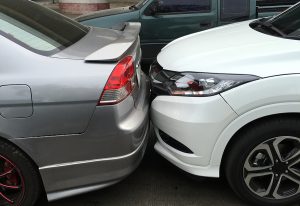How to Avoid Rear End Collisions
 Michael Babboni
Car Accidents
Michael Babboni
Car Accidents
Rear end collisions are very common auto accidents that occur in Florida. This kind of accident can ultimately leave a driver and passengers suffering from serious injuries that can also result in more long term problems down the road. For this reason, it is important to understand how rear collisions happen so you can learn better ways to prevent them and keep everyone much safer on the road.
What Is a Rear End Collision?
A rear end collision happens when a vehicle slams into the
vehicle in front of it. This is usually the result of a driver failing to stop
in time. Rear end collisions can result in a number of serious injuries as
well, including traumatic brain injury, spinal cord damage, whiplash, broken
bones, sprains, strains, crushing damage, and even amputations in some cases.
Causes of Rear End Collisions
While there are many causes for rear end collisions, the
most common is distracted driving. When distracted, the driver fails to notice
that the car in front of them has stopped so they don’t have enough time to
stop their own vehicle.
Other causes for rear end collisions include faulty brake
systems, speeding, following too closely, driving while tired, and road rage.
Most of the time, the person at fault for the rear end collision is the vehicle
in the rear position. However, you may want to discuss your case with an auto
accident attorney to help you determine who really bears liability for the
accident.
How to Prevent Rear End Collisions
As the driver in front, you may feel like there is nothing
you can do to avoid rear end collisions from happening to you. However, there
are still steps you can take to help decrease your risk.
Never Drive Distracted
You should not talk on your cell phone, eat, or become too
engaged in a conversation while you are driving. This can increase your risk of
getting into an auto accident. You need to pay attention and ensure that you
have adequate time and space to stop safely. Increase your following distance
as well to give yourself more time to stop if the vehicle in front of you slams
on their brakes.
Don't Drive While Fatigued
If you are tired, you should avoid driving. Fatigued
driving is almost as dangerous as driving under the influence of drugs and
alcohol. It also decreases your ability to operate the vehicle safely and can
also affect your reaction times.
Collision Avoidance Systems
Newer vehicles are being outfitted with collision avoidance
systems. This kind of technology can help decrease your risk of a rear end
collision and other auto accidents. These systems allow the vehicle to brake
automatically when there is any kind of obstruction in the road. Some systems
can even alert the driver, so they have more time to respond.
Don't Slam on the Brakes
Always pay close attention to your surroundings and be
aware of what is going on. In addition to leaving a good amount of stopping
room, you should also pay attention to the vehicles behind you as well. Don't
slam on your brakes and give them enough time to stop as well. Slow down as you
approach intersections.
If you or someone you know has been involved in a rear end
collision that resulted in damages, consult with an experienced personal
injury attorney to see if you can receive compensation for
those injuries.
